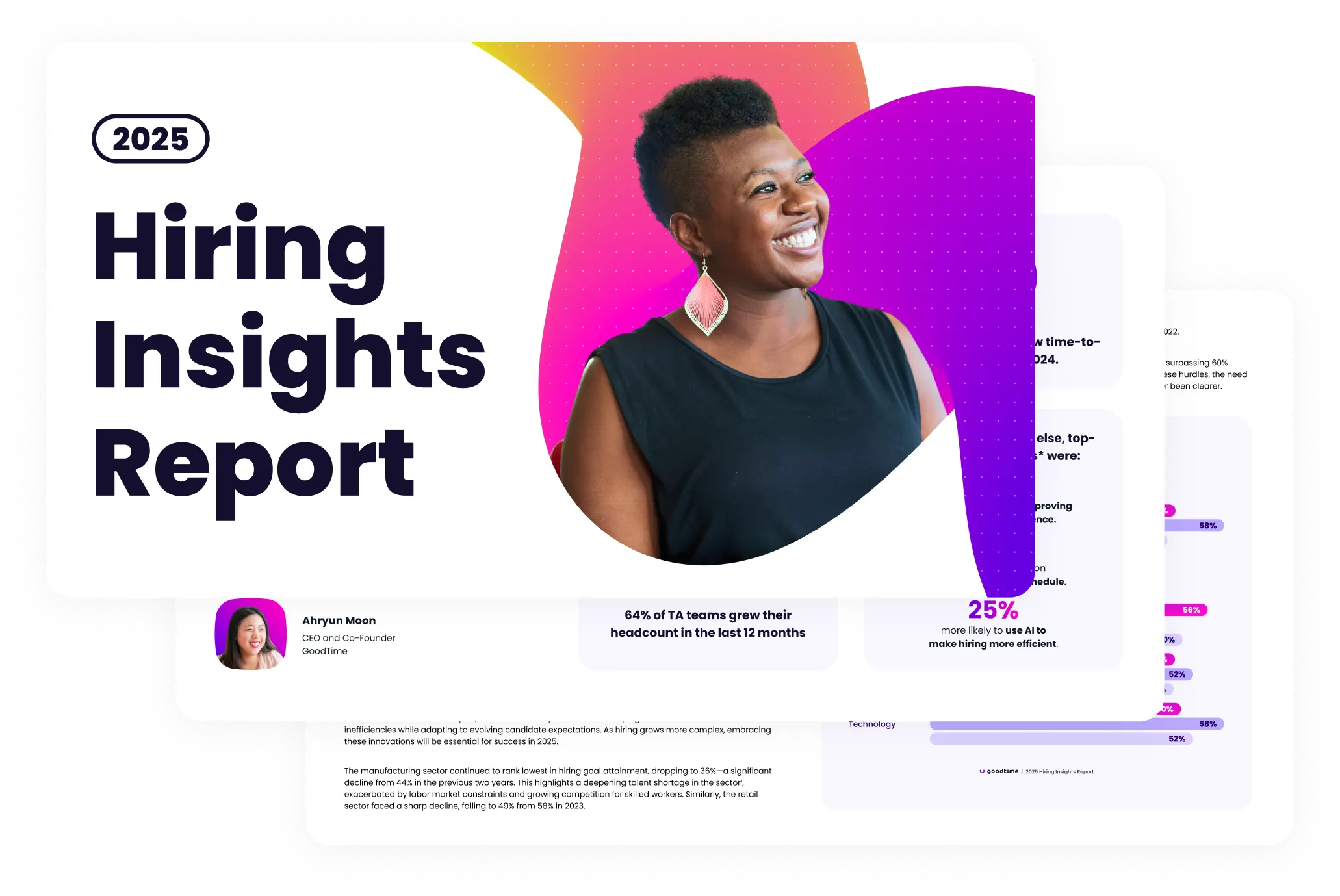The hiring process is a partnership, and at the heart of that partnership is the dynamic between recruiters and hiring managers. While recruiters handle sourcing, resume screening, and guiding candidates through the pipeline, hiring managers play a critical role in defining job requirements and ultimately making the final hiring decision. Yet, for this collaboration to work smoothly, both sides must be in sync—something that doesn’t always come easily.
Hiring managers are the experts in their specific departments, making them crucial to identifying the right talent. However, managing them can be challenging for recruiters, especially when there are communication gaps or misaligned expectations. This article will explore the essential role hiring managers play in the recruitment process, common pain points recruiters face, and how to improve this collaboration for better hiring outcomes.

Unlock 2025’s top hiring strategies: Insights from 500+ TA leaders
Be the first to uncover deep hiring insights specific to your sector — straight from the highest-performing TA teams.

What is a hiring manager?
A hiring manager, simply put, is the future manager of a new hire. As such, they are also the person responsible for overseeing the recruitment process for specific positions within their department or team. They typically work alongside recruiters to determine job requirements, evaluate candidates, and make the final hiring decisions. Their role is crucial because they have firsthand knowledge of the skills and traits needed for the role, ensuring that the new hire will integrate well with the team.
While recruiters handle the logistical hiring process steps— like candidate sourcing, conducting initial screenings, and facilitating communication—hiring managers focus on defining what “success” looks like for the role. From creating detailed job descriptions to conducting interviews and deciding which candidate fits best, their input shapes the direction of the hiring process.
A common misunderstanding is that hiring managers only come into the picture at the interview stage. In reality, their involvement begins much earlier, often starting with creating or reviewing the job description to reflect the exact needs of the team.
By setting clear expectations, hiring managers ensure that both the recruiter and the candidates have a transparent understanding of the role. Yet, this responsibility also opens the door to challenges, especially when their vision for the ideal candidate isn’t clearly communicated.
Common challenges recruiters face with hiring managers
While hiring managers are essential to the recruitment process, the relationship between recruiters and hiring managers can often be challenging. Misalignment of expectations, lack of timely feedback, and poor communication are common pain points.
1. Misaligned expectations
One of the primary challenges is a disconnect between the recruiter’s understanding of the role and what the hiring manager truly wants. Geva Whyte, a Recruiting Coordinator with experience at Lyft, Stripe, and OpenAI, highlights this: “It’s not enough for a hiring manager to say ‘I want a great engineer.’ The criteria for a ‘great engineer’ is outdated…hiring for soft skills like communication, collaboration, and mentorship is the actual important stuff.”
When hiring managers don’t clearly articulate their needs, recruiters end up searching for candidates that miss the mark, prolonging the hiring process and frustrating both parties.
2. Lack of feedback
Recruiters frequently face delays in receiving feedback after submitting candidates for review or after interviews. When hiring managers don’t provide timely feedback, candidates either lose interest or move on to other opportunities. This delay can lead to candidate drop-off, wasted recruiter effort, and longer time-to-hire metrics.
3. Unrealistic timelines
Hiring managers often expect the recruitment process to be quick and seamless without fully understanding the complexities involved. For recruiters, balancing the speed of delivery with finding quality candidates becomes challenging when hiring managers push for tight deadlines that don’t allow adequate time for sourcing and vetting.
4. Poor communication
Jeremy Lyons, a recruiting operations consultant, underscores the importance of communication in the recruitment process: “Candidate experience will play a tremendous role in sourcing and hiring the best talent because communication will always be important. If organizations want to improve, then starting with communication is where it all begins…no ghosting and open, honest communication.”
When hiring managers don’t communicate well, it can result in misunderstandings and missed opportunities for top candidates.
Strategies for managing hiring managers effectively
Building a strong working relationship with hiring managers is key to overcoming the challenges recruiters face. By establishing processes that streamline communication and set expectations early, recruiters can help guide hiring managers to make better, faster decisions.
1. Conduct thorough intake meetings
Intake meetings are critical for setting the foundation of the recruitment process. A successful intake meeting ensures that both parties are aligned on the job description, candidate persona, and the hiring timeline. This meeting should cover the specific skills (both hard and soft) that the hiring manager is seeking, as well as any must-have qualifications. It’s also essential to establish clear expectations regarding communication cadence and feedback turnaround times.
During the intake meeting, recruiters should take the opportunity to clarify any ambiguous job requirements and align with the hiring manager on what success looks like in the role. If the hiring manager is struggling to articulate specific needs, encourage them to focus on real-world examples of what makes their best employees successful, as this can help pinpoint the most relevant skills and attributes.
2. Training hiring managers on interview best practices
Interviewing is a skill, and not all hiring managers are naturally great at it. In some cases, hiring managers may prioritize technical skills over culture fit or overlook soft skills that are crucial to a candidate’s long-term success. Offering interview training to hiring managers on interview best practices can help ensure that they assess candidates holistically and avoid biases.
Training topics could include structured interviewing techniques, using standardized interview questions, and focusing on behavioral indicators to evaluate soft skills such as communication and collaboration. This approach can lead to better decision-making and a more consistent interview experience for all candidates.
3. Implementing efficient debrief sessions
Interview debrief meetings allow for timely and well-rounded evaluations of candidates. After each round of interviews, it’s essential to conduct debriefs to discuss the strengths and weaknesses of each candidate. These debriefs should be scheduled shortly after the interviews to ensure the impressions are fresh and decisions can be made promptly.
It’s also beneficial to standardize the debrief process. For example, using a scorecard or predefined criteria can help ensure that all hiring panel members are evaluating candidates against the same standards. This structured approach helps avoid gut-feeling decisions, leading to more objective outcomes.
Technology and tools to improve collaboration between hiring managers and recruiters
Technology can dramatically improve the recruiter-hiring manager relationship by streamlining communication and automating repetitive tasks. With the right tools, teams can reduce friction, save time, and maintain a smooth hiring process.
AI-assisted scorecards
AI-powered scorecards help hiring managers assess candidates consistently by providing a structured framework for feedback. These tools can analyze responses in real time, flagging key skills or attributes based on predefined criteria. This ensures standardized evaluations across all interviews and removes bias, enabling faster and more informed decision-making.

Interviewer portals
Interviewer portals offer a centralized hub for hiring managers to access interview materials, candidate profiles, and scheduling information. This tool ensures that managers are well-prepared for interviews, as it provides a quick overview of the candidate’s background and any pre-existing notes. By centralizing this information, hiring managers stay on track throughout the process and can seamlessly provide structured feedback through integrated scorecards.

Automating scheduling and reminders
Automated interview scheduling tools, integrated with AI-driven reminders, help both recruiters and hiring managers reduce the time spent coordinating interviews. These platforms not only automate the logistics of scheduling but also ensure that interviewers receive timely reminders and access to interview preparation materials ahead of time, keeping the process efficient.
Data-driven reporting and insights
Advanced tools offer real-time recruiting analytics and metrics, such as hiring speed, candidate feedback, and the time each hiring manager spends on recruitment tasks. This allows recruiters and hiring managers to identify inefficiencies and optimize their approach, leading to faster hires and improved candidate experiences.
When recruiters and hiring managers work in harmony, the results are evident in both the speed and quality of hires. A strong partnership can transform the hiring process from a series of disjointed steps into a smooth, efficient operation.
1. Faster time-to-hire:
When both recruiters and hiring managers are aligned from the outset, decisions are made faster, reducing the overall time-to-hire. Automated scheduling, standardized feedback through AI scorecards, and clear communication channels help eliminate bottlenecks, allowing teams to fill roles quickly without compromising on quality.
2. Improved candidate experience:
A seamless hiring process, driven by well-prepared hiring managers and streamlined communications, results in a better candidate experience. A positive candidate experience not only helps attract top talent but also builds a strong employer brand.
3. Higher quality hires:
When recruiters and hiring managers are on the same page regarding the necessary skills and attributes for a role, they make better hiring decisions. Structured interviews, powered by AI-assisted scorecards, ensure that every candidate is assessed fairly and consistently, leading to hires that are a better fit for the company culture and role requirements.
4. Increased retention rates:
A strong partnership reduces the risk of hiring mismatches, leading to higher employee retention rates. Candidates who are carefully selected based on a clear, aligned vision between the recruiter and hiring manager are more likely to succeed and stay in their roles long-term.
FAQs on hiring managers
A hiring manager is the future supervisor of a new hire, and oversees the recruitment process for specific roles within their team, collaborating with recruiters to define job requirements, interview candidates, and make the final hiring decisions.
Recruiters source and screen candidates, while hiring managers define the role’s requirements and assess candidates during interviews. Successful collaboration ensures a smooth hiring process.
Common challenges include misaligned expectations, lack of timely feedback, poor communication, and unrealistic timelines.
By conducting thorough intake meetings, offering interview training, using AI-driven tools for feedback, and automating scheduling, recruiters can enhance communication and ensure a smoother hiring process.
Better hiring managers, better hires
Building a strong partnership with hiring managers is essential for recruiters to succeed in today’s competitive talent market. By setting clear expectations, leveraging technology, and fostering open communication, recruiters can guide hiring managers toward better hiring outcomes. It’s about working together to reduce inefficiencies, enhance candidate experiences, and make data-driven decisions.




